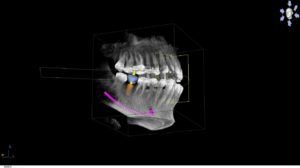
Galileous and Implant Planning
Dental implants are permanent prosthetics that restore a mouth’s function and aesthetics. A prosthetic tooth like an implant is needed when a person has lost teeth due to decay, sickness, or lifestyle accidents. Instead of having to take dentures in and out, implants stay in your mouth permanently and are cared for like your other teeth.
Continue Reading...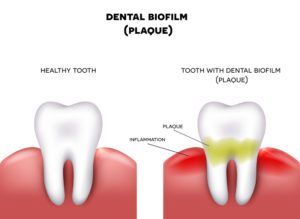
Causes of Periodontal Disease
Periodontal disease is common among dental patients and is the leading cause of tooth loss among American adults. It develops as the result of an accumulation of harmful bacteria harbored in hardened plaque on the teeth both above and beneath the gum line. Plaque is usually brushed or flossed away; but plaque allowed to remain […]
Continue Reading...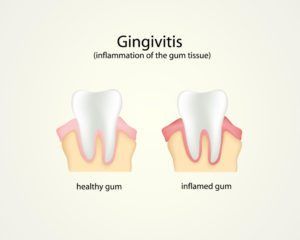
Gingivitis & Periodontitis
Gingivitis and periodontitis are gum diseases caused by a proliferation of bacteria along and beneath the periodontal tissues. Gingivitis is the mildest form of periodontal disease, beginning with minor symptoms like gum inflammation. Although it is highly treatable, gingivitis is often left untreated and allowed to progress into an advanced stage of a periodontal disease […]
Continue Reading...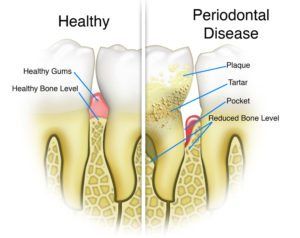
What is Periodontal Disease?
Periodontal disease is a highly common infection of the periodontal tissues (gums and bone) that are responsible for supporting the teeth. These infections are caused by bacteria that grow on the teeth near the gum line due to poor brushing and flossing practices. Periodontal disease is known as gingivitis during its earliest stages, which is […]
Continue Reading...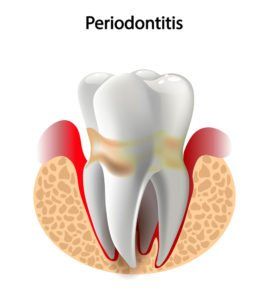
Types of Periodontal Disease
Periodontal disease is one of the most common diseases in America, affecting nearly 65 million adults over age 30. There are two types of periodontal disease – gingivitis and periodontitis. Each refers to an accumulation of bacteria along the gum line though one is more severe than the other. Gingivitis – the least invasive form of […]
Continue Reading...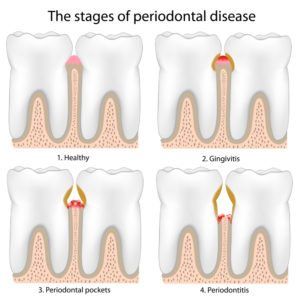
Signs & Symptoms of Periodontal Disease
Periodontal disease – also known as gingivitis and periodontitis – is most easily identified by the visible symptoms it causes as it progresses. In its beginning stages, a periodontal disease often causes no symptoms at all, making it difficult for the average person to notice. With time, bacteria begin causing inflammation in the gums, which […]
Continue Reading...
What is a Periodontist?
A periodontist is a dentist who has undergone additional specialty training beyond dental school pertaining to the prevention, diagnosis, and treatment of gum diseases. While general dentists often treat the mildest cases of periodontal disease, most patients with moderate to advanced gum disease are referred to periodontists. A periodontist can carry out complex periodontal treatments […]
Continue Reading...
Post Op for Periodontics
A periodontal operation is a surgery to restore gum tissue lost to periodontal disease, improve the cosmetic appearance of one’s smile, or otherwise prepare the teeth for restorative prosthetics. Periodontal surgery is performed under local anesthesia – usually from the comfort of a dental office. Though there is little or no discomfort associated with the […]
Continue Reading...
Dental Health and Your Diet
Your body works hard to convert the foods you eat into energy. You may not think twice about what you are eating – especially when it comes to grabbing an afternoon snack or sipping on a vanilla latte on your commute. But the food you put in your mouth affects more than just your waistline. […]
Continue Reading...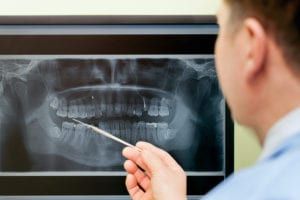
Digital X-Rays
Digital x-rays are a more streamlined way of taking dental radiographs. Like traditional x-rays, digital versions provide an in-depth view of the structures of the mouth, helping dentists detect complications and develop effective modes of treatment. Digital x-rays are capable of revealing hidden caries, bone erosion, and even tooth decay hiding beneath restorations. Requiring less […]
Continue Reading...
Bad Breath
Having bad breath can be an embarrassing problem – especially if you are regularly face to face with other people. Known professionally as halitosis, bad breath plagues many people every day. Most cases of bad breath can be remedied by efficiently brushing the teeth. However, some types of bad breath are chronic or recurring, which […]
Continue Reading...
How to Brush Your Teeth
Brushing your teeth is probably a standard part of your daily routine, but chances are you aren’t following the American Dental Association’s guidelines for cleaning your teeth properly. The ADA currently recommends that you brush your teeth at minimum of two times each day – preferably morning and night or anytime you eat foods that […]
Continue Reading...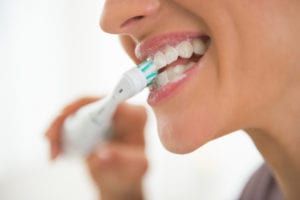
Electric Brush vs. Manual Brushes
Preventative dentistry is about more than just visiting your dentist twice yearly for an exam and thorough cleaning. In fact, the majority of your preventative care is done at-home as a part of your normal hygienic routine. Many residents use manual toothbrushes to remove debris and plaque from their teeth. However, electric brushes have become […]
Continue Reading...
How to Floss Your Teeth
Flossing is an important part of an oral hygiene routine, but research suggests that fewer than half of Americans do so daily. Flossing is simple and only takes an extra couple of minutes per day. Developing a healthy habit of flossing can prevent tooth decay and gum disease, and it may allow you to keep […]
Continue Reading...
Fluoride and Decay Prevention
Fluoride is a naturally occurring element that has been shown to help strengthen teeth in children and also prevent decay in people of all ages. Topical fluoride, in particular is helpful for promoting oral health. The American Dental Association has publicly endorsed the use of fluoride for the prevention of dental caries, as has the […]
Continue Reading...
Dentistry Post-Op Questions
If you are undergoing a dental procedure or operation, you will be given a set of post-operative instructions to abide by in the hours, days, and weeks after your treatment. Following these instructions is essential to preventing infections in surgical sites, protecting restorations, and minimizing the possibility of experiencing complications. Post-operative instructions vary from procedure […]
Continue Reading...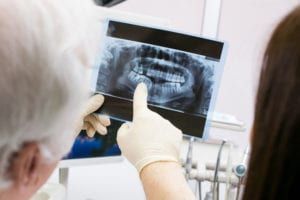
Dental X-Rays
For years, dental x-rays have been used to diagnose oral health complications and detect decaying or damaged teeth. X-rays provide a unique view of the mouth that isn’t possible with a visual exam alone. When x-rays are taken, the teeth and bones absorb the majority of the ray, making them highly visible on film or […]
Continue Reading...